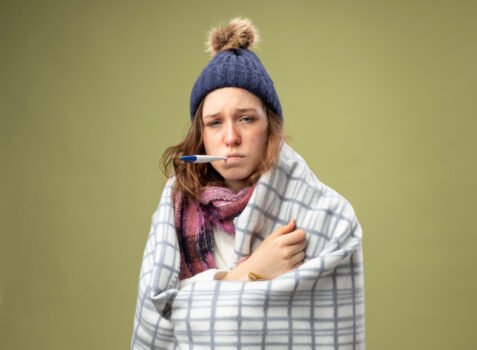Common Cold Symptoms
What is the Common Cold?
The common cold is a viral infection of the upper respiratory system, primarily caused by rhinoviruses, though other viruses like coronaviruses can also cause cold symptoms. It typically affects the nose and throat, leading to mild symptoms that resolve within a week or two.
Classify the Common Cold
Illness: The common cold is classified as a viral respiratory illness. It is highly contagious and usually causes mild symptoms, though it can sometimes lead to complications in vulnerable individuals.
Common Cold Statistics
- Prevalence: The common cold affects adults 2-4 times per year and children up to 8 times per year.
- Global Impact: Over 1 billion cases occur annually in the United States alone.
- Seasonal: Cold symptoms are more common in the fall and winter, with the peak of infections occurring in colder months.
Types of Common Cold
- Viral Rhinopharyngitis: The most common form caused by rhinoviruses, leading to symptoms such as a runny nose, cough, and congestion.
- Coronavirus Cold: Caused by coronaviruses, which can lead to more severe symptoms, particularly in vulnerable individuals.
- Respiratory Syncytial Virus (RSV): Primarily affects children and infants, causing wheezing and coughing.
- Influenza-like Cold: Shares some symptoms with the flu, such as fever and body aches, but is generally milder.
Health Signs and Symptoms
Early Signs: Sneezing, sore throat, runny nose, or mild fatigue may appear within one to two days of exposure to the virus.
Common Symptoms:
- Sneezing and runny nose
- Sore or scratchy throat
- Cough
- Congestion
- Mild body aches
- Low-grade fever (less common)
- Fatigue and malaise
- Watery eyes
Anatomy and Physiology
The common cold affects the following body parts:
- Nose and Sinuses: The primary area for congestion and mucus production.
- Throat: Often becomes sore or irritated.
- Lungs: Mild coughing and congestion may affect breathing but not typically cause deep chest issues.
- Eyes: Watery eyes may occur as a response to irritation from the virus.
Causes
Brief Description: The common cold is caused by a variety of viruses, most commonly rhinoviruses, which spread through droplets from coughs, sneezes, or touching contaminated surfaces.
Common Causes:
- Rhinoviruses: The most prevalent cause, accounting for up to 40% of colds.
- Coronaviruses: Can cause more severe cold-like symptoms.
- Respiratory Syncytial Virus (RSV): Affects the respiratory tract, especially in infants.
- Parainfluenza Viruses: Responsible for some cold-like symptoms, often causing croup in children.
- Adenoviruses: Cause symptoms similar to colds, but may also cause eye infections or gastrointestinal issues.
Common Cold Stages
- Early Stage (1-2 days): Sneezing, sore throat, and mild congestion.
- Peak Stage (2-5 days): Full-blown symptoms like cough, nasal congestion, and sore throat.
- Recovery Stage (5-7 days): Gradual improvement with mild lingering symptoms like a cough or congestion.
Prevention
- Wash hands regularly with soap and water.
- Avoid close contact with individuals who are sick.
- Use tissues or the elbow to cover sneezes and coughs.
- Disinfect frequently touched surfaces.
- Avoid touching your face, especially eyes, nose, and mouth.
- Maintain a healthy immune system through proper nutrition and rest.
Common Cold Diagnosis
Diagnosis is typically made based on symptoms alone. Healthcare providers may differentiate between a cold, flu, or other infections based on the severity of symptoms.
Tests & Examinations
- Physical Exam: Doctors examine the throat, ears, and sinuses.
- Throat Culture: Used to rule out bacterial infections like strep throat.
- Rapid Flu Test: In cases where flu is suspected, a rapid test may be used.
Health Professionals
- Primary Care Physicians: Treat cold symptoms and help distinguish from other conditions.
- Pediatricians: Specialize in treating children, especially those who are at risk for complications.
- Urgent Care Providers: Can offer rapid diagnosis and treatment if symptoms worsen.
- Nurses and Respiratory Therapists: Assist in managing symptoms and provide advice.
Reasons to See a Professional
- If symptoms worsen or last longer than 10 days.
- If high fever or severe body aches develop.
- If breathing difficulties or chest pain occur.
- If the individual is very young, elderly, or has a weakened immune system.
Process to Find the Right Professional
- Start by consulting your primary care physician.
- For urgent or severe cases, visit an urgent care center.
- If symptoms are particularly concerning for a child, see a pediatrician.
Visit Preparation
- Keep track of symptoms: duration, severity, and changes.
- Take note of any over-the-counter treatments used.
- Prepare a list of current medications and medical conditions.
Questions to Ask
- How long will my cold last?
- Are there any red flags or signs of complications I should watch for?
- What can I do to feel better sooner?
- Are there any specific treatments or medications I should avoid?
- Do I need to be concerned about any potential complications?
Diagnosis
Doctors generally diagnose the common cold through a physical exam and by assessing symptoms. Tests are rarely needed unless other conditions (e.g., flu, strep throat) are suspected.
Procedures
Typically, no procedures are needed for a common cold. However, tests may be done to rule out other respiratory conditions.
Treatments
- Rest: Rest is important for recovery and to avoid spreading the virus.
- Hydration: Drink plenty of fluids to stay hydrated.
- Over-the-counter Medications: Decongestants, antihistamines, and pain relievers (e.g., ibuprofen) can ease symptoms.
- Cough Suppressants: For persistent cough.
- Saltwater Gargles: To soothe a sore throat.
- Nasal Sprays: For nasal congestion.
Health Monitoring
- Keep track of symptoms, especially if they worsen.
- Use a thermometer to monitor fever.
- Pay attention to changes in breathing or chest discomfort.
How to Manage the Common Cold
- Rest: Ensure adequate sleep to help your body fight the virus.
- Hydration: Drink fluids like water, tea, or broths.
- Nutrition: Eat a balanced diet to support the immune system.
- Avoid Spreading: Stay home, cover coughs and sneezes, and wash hands frequently.
Nutrition Dos and Don’ts
Dos:
- Eat foods rich in vitamin C (citrus fruits, berries) to support the immune system.
- Stay hydrated with water, herbal teas, and broths.
- Consume honey and ginger to soothe the throat.
Don’ts:
- Avoid excessive alcohol or caffeine as they can dehydrate the body.
- Don’t eat overly processed or sugary foods that can weaken immunity.
Lifestyle Dos and Don’ts
Dos:
- Get enough rest to help your body recover.
- Use a humidifier to ease congestion.
- Practice good hygiene by washing hands regularly.
Don’ts:
- Avoid smoking or exposure to smoke, as it can irritate the respiratory system.
- Don’t overexert yourself; give your body time to heal.
Emergency Situations
- Difficulty breathing or shortness of breath.
- High fever lasting more than 3 days or rising above 103°F (39.4°C).
- Severe chest pain or pressure.
- Symptoms worsening rapidly.
What to Do:
- Seek immediate medical attention if any of the above occur.
Prognosis
The common cold usually resolves on its own within 7-10 days. Most people recover without complications, though those with weakened immune systems or chronic conditions may experience more severe symptoms or complications.
Clinical Products
- Decongestants: Help clear nasal congestion.
- Cough Syrups: Relieve coughing.
- Pain Relievers: Ibuprofen or acetaminophen for pain and fever.
- Saline Nasal Sprays: Help to clear the nasal passages.
- Throat Lozenges: Soothe sore throats.
Services
- Urgent Care Clinics: Offer rapid diagnosis and treatment for colds.
- Primary Care Physicians: Provide advice on managing symptoms and determining if further treatment is needed.
- Telemedicine: Consult a healthcare provider remotely.
- Pharmacy Services: Provide over-the-counter medications for symptom relief.
Frequently Asked Questions
-
Can I catch the cold from someone with the flu?
No, they are caused by different viruses, though both are contagious.
-
How long does a cold last?
Typically 7-10 days, but symptoms can last longer in some cases.
-
Can cold weather cause a cold?
No, cold weather doesn’t directly cause a cold, but it can weaken the immune system.
-
Can I go to work with a cold?
It’s best to rest at home to prevent spreading the virus to others.
-
Should I take antibiotics for a cold?
No, antibiotics do not work on viral infections like the common cold.
-
How can I prevent a cold?
Practice good hygiene, avoid close contact with sick individuals, and strengthen your immune system.
-
Can cold weather make symptoms worse?
Cold weather can exacerbate symptoms like congestion and sore throat.
-
Are there any home remedies for the common cold?
Yes, honey, ginger, and steam inhalation can soothe symptoms.
-
Is it safe to exercise with a cold?
Light exercise may be okay if you don’t have a fever, but listen to your body and avoid overexertion.
-
Can children get the common cold?
Yes, children are particularly prone to colds and may experience more severe symptoms.





